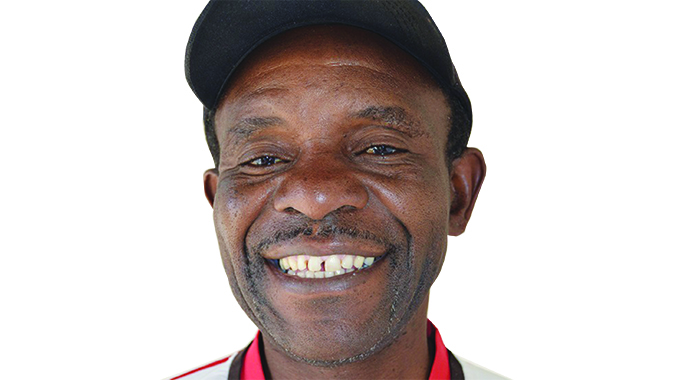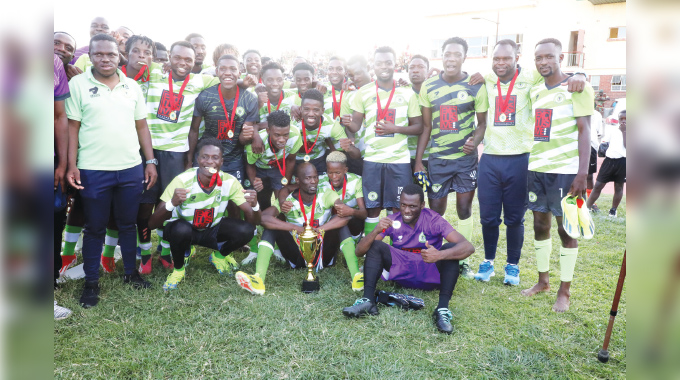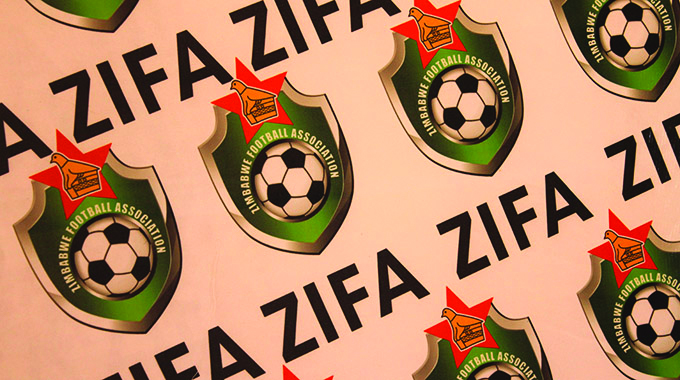Football legend Godfrey Paradza bares all, regrets and triumphs

Ricky Zililo, Senior Sports Reporter
FOR soft-spoken football legend Godfrey “GP” Paradza, walking into the first team of one of the country’s giants back then, Zimbabwe Saints, as a schoolboy at Sobukhazi Secondary is something that will remain etched in his memory.
Born on January 16, 1965, at Mpilo Hospital in Bulawayo, Paradza was taken by surprise in 1982 when Zimbabwe Saints great Gibson Homela enticed him to join the first team as a 17-year-old.
He was in Form 4 then and had played a key role in the famed Highlanders FC’s Under-16 squad that was popularly known as Liverpool in the 1981 Castle Cup tournament, which they lifted after beating Mhangura 3-2 at Rufaro Stadium in Harare.
It was such national junior championships that helped groom some of the country’s finest players and it was no surprise when Chikwata, as Zimbabwe Saints were known, pursued Paradza. His arrival at Saints was rosy since he had been guaranteed first team action when he was lured from Highlanders’ juniors, a relationship that later turned toxic at the end of 1983 when Paradza learnt that Chikwata officials had secretly sabotaged his move to English side Coventry City.
The English club was impressed by the defender during their 1983 tour of Zimbabwe when they beat the national Under-20 side, which Paradza played for. They went on to lose 2-4 to Zimbabwe Saints.
Coventry City then sent air tickets for Paradza, Jimmy Phiri and Shacky Nyathi to attend trials, but Chikwata officials didn’t notify the players and the deal went down the drain.
Narrating how he left Zimbabwe Saints for Darryn T at the beginning of 1985, Paradza said: “When I finished my O-Levels in 1982, I got a job at the National Railways of Zimbabwe together with Ephraim Chawwanda. We played Coventry City and they expressed interest in me, Jimmy Phiri and Shacky Nyathi.
They sent tickets, but abadala beteam thought if we left it would affect the club and they kept that information away from us. The following year there was supposed to be an elective general meeting at the club and the then secretary John Nyazika (late) told us that his executive didn’t want him because he had told them to let us go to England.
“I happened to be captain of Matabeleland North select squad and there was this guy Trevor McMillian, who worked at Merlin. He organised a trip to Newcastle (England) and $600 was needed for my trip. It was a lot of money then and Saints were not keen to pay, but Highlanders covered Madinda Ndlovu’s ticket and he went for trials. That hurt me so much.
“When Bobby Clark came to Highlanders, Loughty (Lawrence Phiri) tried to get me back to Bosso, but Saints refused. In the end, there were frictions and I decided to apply for work at Zesa. I got the job and moved to Harare. They tried to plead with me to do like what Homela and Steve Kwashi used to do, to travel between Harare and Bulawayo on weekends for games, but because of the frustrations I had, I then joined Darryn T in 1985. In 1991 I then joined Dynamos.”
Besides making the Saints first team at a young age where he rubbed shoulders with players he adored as a youngster, who included Homela, Ebson “Sugar” Muguyo and Max Tshuma, Paradza believes his upbringing shaped his footballing career.
Born into a family of six, a girl and five boys, Paradza did his Grade 1 to 3 at Gwinyai Primary School in Mbare, Harare, where he was in same class with Joe Sanangurai.
He then transferred to Nharira Primary, also in Mbare, where he did Grade 4 and 5, sharing class and playing football with the likes of goalkeeper Fanuel Ariberto, Pasanduka Pakamisa and Stanley Mashezha, whom he reunited with playing club football.
He returned to Bulawayo and enrolled at Lobengula Primary School in Mzilikazi for his Grade 6 and 7.
It was at Lobengula Primary that he linked up with Dumisani Nyoni, the late Mercedes Sibanda, goalkeeper Sydney Zimunya and Netsai Moyo, who went on to become key members of the Bosso “Liverpool” side coached by revered juniors’ trainer Ali “Baba” Dube.
“I then went to Sobukhazi Secondary where I met my best friend Themba Lunga, who later went on to play for Highlanders, while I was at Zimbabwe Saints.
“I had a brother Themba Kanyemba, who used to play for Dynamos and used to take me to DeMbare games. He didn’t make it into the senior team, but was prominent in the reserve side as a goalkeeper, defender or striker. He pursued studies more and left football, leaving me in the Dynamos juniors.
“Later on I moved to Zimbabwe Saints as a junior where I played for the Under-14s and then crossed the floor to Highlanders where I played for the popular Under-16s coached by Ali Baba. I think we were the best juniors because we never lost a match, hardly conceded goals and we used to score as defenders.
I partnered Willard Khumalo at centre-back. We were so good that Ali Baba used to say lihlaleleni emuva. He would say one week I venture upfront and the following week it will be Willard. Whenever we overlapped, we would score. At the end of the day Ali Baba said Willard mustn’t move upfront because his recovery was poor. Willard was slow, while I was very fast,” said Paradza.
“At Liverpool, some of the prominent faces in that squad were Willard, Netsai Moyo, who was our captain. Netsai, Sam Sibanda, Sama Ncube, Babs Ncube, father to Graham Ncube, Oliver Ncube and Hagai Moyo, brother to Netsai. Most of the guys couldn’t break into the first team because it was difficult, so most joined company teams like Turnal, Red Seal, Ingwebu and that’s how we disbanded.”
He said when he featured for Saints a 17-year-old, Khumalo and Netsai Moyo wanted to leave Bosso, but Phiri took them to the first team.
“I still remember Willard started playing as a left-back before later being moved into the midfield and Netsai as a right-back.”
Paradza said it was quite an experience playing alongside Homela, Sugar Muguyo and Max Tshuma, as they always encouraged him.
Playing as a right-back was tough for Paradza as he faced some of the country’s hot and tricky wingers in the form of Madinda Ndlovu, Boy Ndlovu, Tanny Banda, Robert Godoka, Edward Katsvere, Moses Chunga, Jimmy Mbewe and Joseph Zulu.
Paradza charmed national team coaches Shepherd Murape and Peter Nyama in his first season with Saints. Murape attended one Saints’ training session at Ross Camp in 1982 and was impressed to see Paradza containing Tshuma, who was in the national team.
“In 1982, I was identified by Murape, who sent Peter Nyama to come and watch me before being incorporated into the national Under-20s.
I remember in my second game against BAT Ramblers, there was a player called Shelton Mangwende, who ended up at Caps United, whom I marked out. After the game, Homela told me that I was wanted in the national Under-20,” he said.
The national team technical team and Sobukhazi Secondary had an arrangement that saw Paradza travelling to Harare for national duty on Thursdays, training once or twice before a national Under-20 assignment.
If the team was playing outside the country, Paradza was allowed to leave on Tuesday, with Nyama making sure he does his school work while in camp.
“I never let that fame get to me. My parents were disciplinarians and it never got into my head that I was with the national team and Zimbabwe Saints while at school. Even abantwana benkomponi were like ‘uGoddie uphuma kuNewspaper’ but I wasn’t carried away.
“Our English teacher called Mr Tanbull would buy two copies of the newspaper every Monday whenever I came out in the paper. One was for me and the other he’d cut the piece and paste it on the notice board.”
Paradza said competition at Darryn T was stiff and coach Joe Quinn preferred him in midfield, although he was comfortable as a central defender.
“I’ll be honest, when Peter Nyama came to Darryn T, it was because of his age-cheating scandal after he allegedly altered Paul Gundani’s birth certificate. He (Nyama) wanted the President (Canaan Banana) to assist him in that regard because he was facing jail time. It was his arrival that saw me reverting to the back, even though he played me at right-back,” he said.
It was, however, at Dynamos where he enjoyed success, winning three league championships in 1991, 1994 and 1995.
At DeMbare, he played alongside Angirayi Chapo, Stanley Chirambadare, Henry Chari, Kaitano Tembo, Vitalis Takawira, Francis Shonhayi, Claudius Zviripai and Memory Mucherahowa.
Dynamos’ 1992 power struggles between Jockoniah Nhekairo and Morrison Sifelani almost forced Paradza out of football.
“When the season was about to start, there were two factions at Dynamos. Zifa said my loan from Darryn T was with Nhekairo and didn’t recognise Sifelani. It was tight, I think I played one or two games then some Dynamos people came and broke windows at my place in Mbare. I had a small child and that really scared me.
“This incident came after we drove to Rufaro Stadium via a long route, as people had barricaded the road next to the cemetery for our game against Mhangura. The players that had remained at Dynamos were myself, Vitalis, Chari, Claudius, Shonhayi and Peter Fanuel, who came here and there, while some came to collect money. After that incident, I left Dynamos only to return when David George took over as coach and stabilised things,” said Paradza.
He quit the game after the 1995 league titles after a “frank talk” with coach Sunday Chidzambwa.
“My regret is moving away from Harare when I retired after our 1995 championship win because while drinking with Sunday, he told me that he wanted to create a new role for me in the technical team. He was frank and said, ‘look, there are young players coming up and you can’t match their pace’, which was true.
“There were some issues at work that forced me to return to Bulawayo and Elvis Chiweshe and Clayton Munemo took up those roles. That, I still regret,” said Paradza.
He bemoaned the “death” of football compared to yesteryear.
“Growing up, I used to watch the likes of George Shaya, Gibson Homela and Barry Daka, among others. They were dedicated and played every week. There was consistency with line-ups. I respected the generation before us; their football was better than ours.
“Then came science and improvements. Thina sasigada amasteps at Barbourfields Stadium and that hurt our knees. But now, you could see development from old school.
To say this age is better than the other is difficult. I’ll safely say akusela bhora yet coaching methods have improved, there are better facilities and eating habits have changed, but still there’s a decline in football. Maybe there’s too much emphasis on tactical play. Back then tactical play was there, but individual brilliance was encouraged. Now these boys hardly dribble,” Paradza said. — @ZililoR











Comments